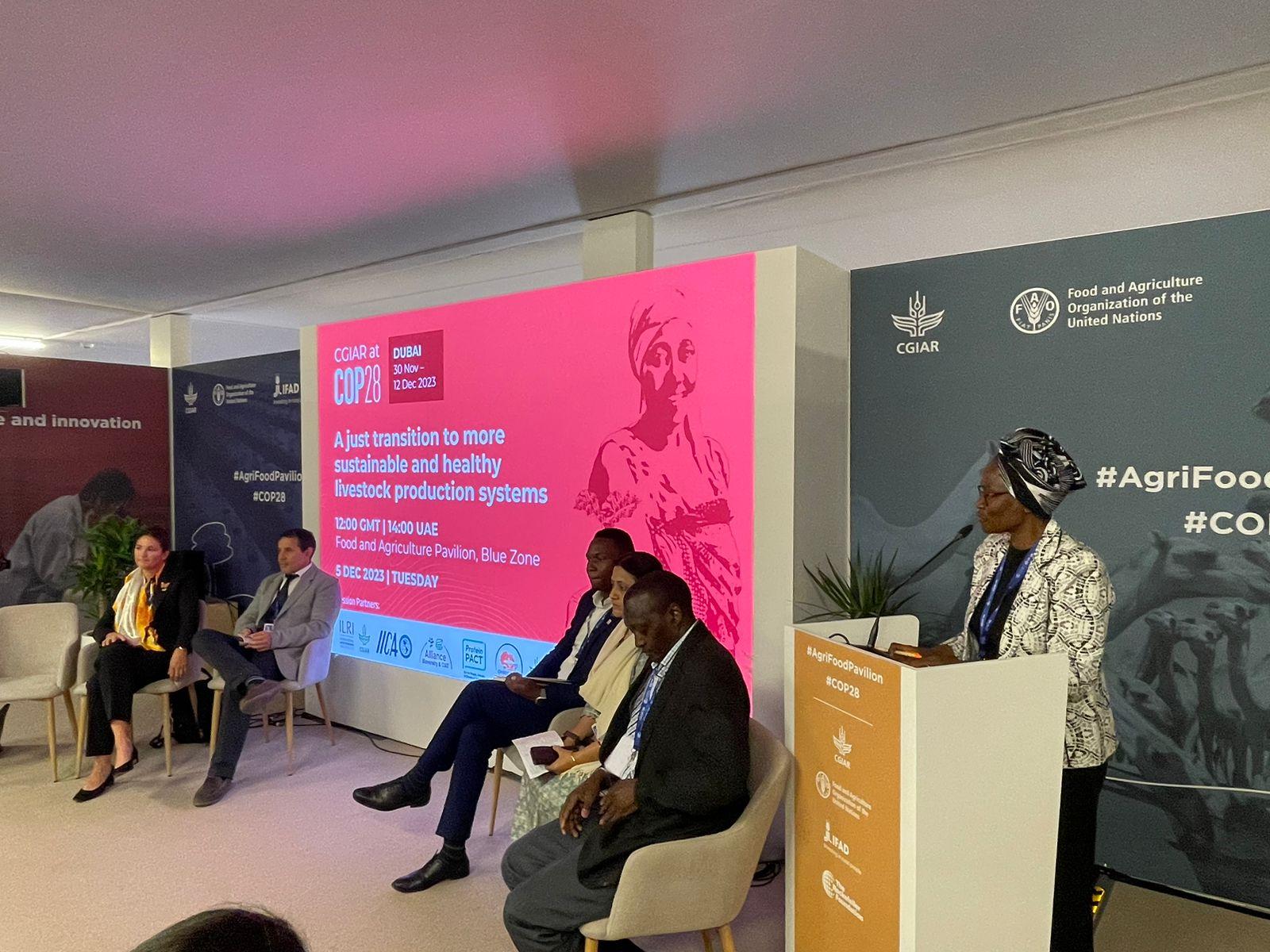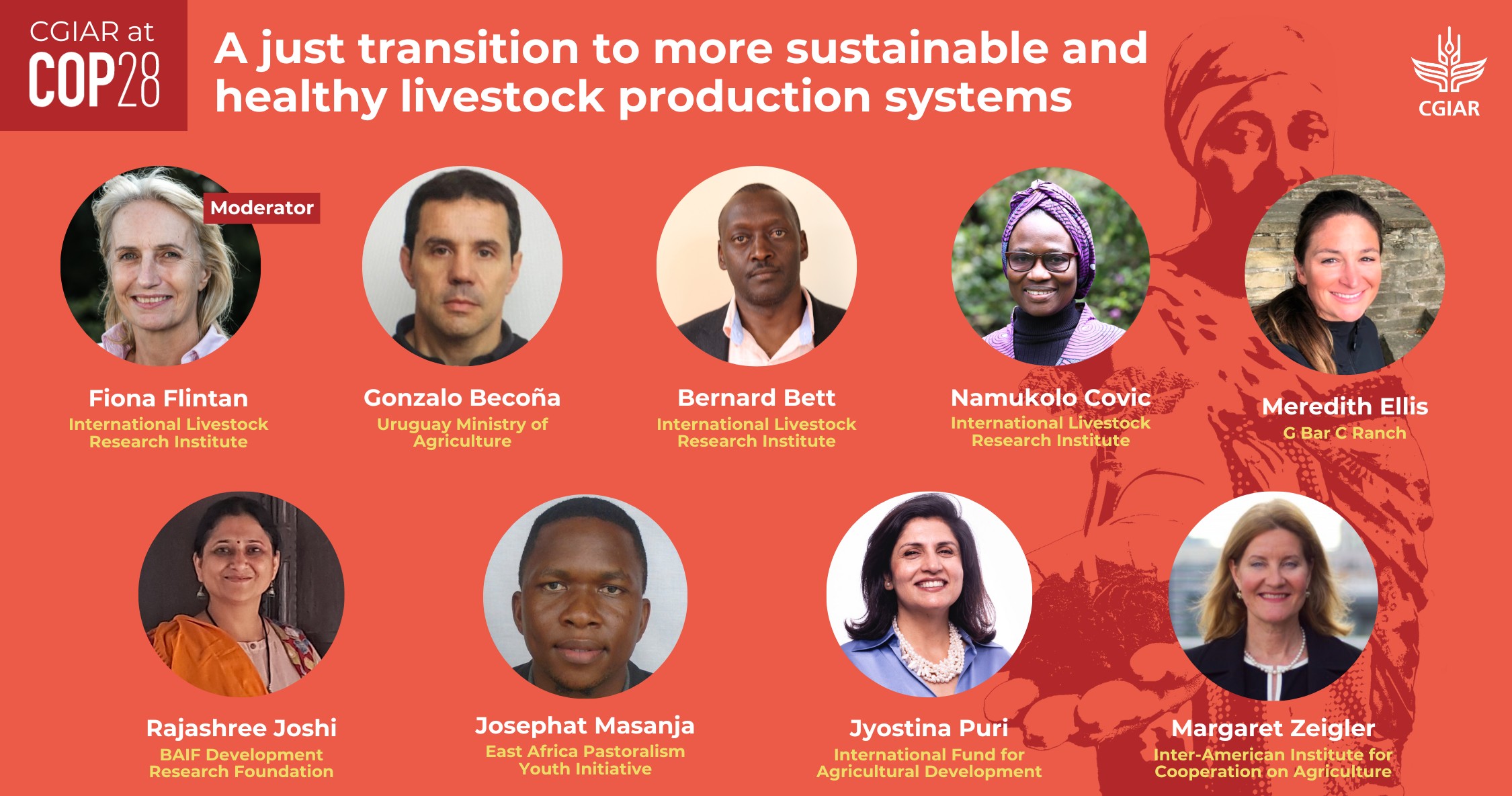
A just transition to more sustainable and healthy livestock production systems – 5 Dec
Core message
Event summary
Livestock products are not only essential for meeting nutritional needs but are also vital for the livelihoods of a significant portion of the global population, particularly in low- and middle-income countries. According to IFAD’s latest statistics, over a billion people depend on livestock for a part of their income or livelihood.
Despite its significance, addressing livestock emissions is imperative for reaching climate change targets. On 5 December, the Food and Agriculture Pavilion at COP28 held a compelling session to explore innovative methods to reduce livestock emissions worldwide. The session also focused on how to support smallholder farmers in adapting to the impacts of climate change.
The guest panel included diverse experts: a sustainable rancher from the United States, a policy maker from Uruguay, a livestock development expert from India, a One Health scientist from Kenya, and a youth pastoralist from Tanzania. Each panelist brought unique insights and practical case studies centering on ways to decrease emissions and enhance productivity. Their discussions covered a range of topics, including policy support and the adoption of innovative, climate-resilient practices in animal health, breeding, land restoration, and the development of robust systems. These strategies are intended to help livestock farmers adapt and flourish amidst the challenges posed by climate change.

Key takeaways
- Emerging technologies and improved mitigation reporting systems can play a key role in reducing the impact of livestock on the climate, particularly in high-income countries.
- However, high cost, limited availability and inappropriateness of expensive non-feed supplemented production systems limit their uptake.
- For the farmers around the world, livestock emissions mitigation and reduction is best addressed through climate-smart livestock production with triple-wins: boosting productivity, enhancing resilience and reducing GHG emissions.
- Multi-stakeholder partnerships are needed to innovate, develop and scale-up climate-smart agricultural solutions for this.
- For a 'just transition' to more sustainable livestock food systems there is a need to invest in adaptation as well as mitigation.
- Climate change profoundly impacts ecosystems, human and animal health, and agriculture, making the application of a One Health approach essential for comprehending these systemic effects.
what panelists had to say
‘We need to manage our livestock in a way that mimics their natural existence. We should defer to nature, instead of man’s ‘heavy hand’, to find that balance where ruminants can benefit from the landscape and the landscape benefits from their activity.’- Meredith Ellis, G Bar C Ranch
--
‘Pastoralist youth are aware of the challenges of livestock on climate – deforestation, overgrazing and methane emissions – and they have started to implement more sustainable practices, such as rotational grazing in pastoral communities and planting pasture to produce silage (for feed)… We are also advocating for greater land rights, calling for more financial resources from the government to be directed to pastoralism.’ - Josephat Masanja, East Africa Pastoralism Youth Initiative
--
‘With climate change, collective preventive action is necessary to prevent the spread of disease resulting from prolonged drought or excessive rainfall. Farm animals should receive synchronized multiple vaccines while farmers need improved access to disease surveillance and climate information.’ - Bernard Bett, animal health scientist, lead One Health Centre in Africa (OHRECA), ILRI
--
‘We need to balance international pressure to reduce emissions with the vulnerability of farmers. We need policies that are practical and don’t leave anyone behind. Farmers need access to technologies, together with capacity-building measures and incentives to help them adopt and shift their behaviors. - Gonzalo Becoña, National Agricultural Research Institute of Uruguay (INIA)
--
‘To reduce emissions, we focus on better genetics, improved breeding services, better nutrition for animals and promoting preventive health actions. We are doing research trials on dual-purpose crops because of land pressures. We are also working on dung-based pathways – looking at improved biogas not only as a clean energy source. We are separating the slurry into solids and liquids, treating the liquid to transform it into liquid fertilizer. There is a circularity we are trying to achieve while looking at opportunities to capture methane at every stage of the livestock life-cycle.’ - Rasjashree Joshi, BAIF Development Research Foundation
Looking Forward
We need action, investment, and innovation now more than ever. Jyostina Puri of IFAD offered her suggestions on how we can move things forward:
There is a huge opportunity to take innovations forward to combat climate change. Panelists spoke about feed management, animal husbandry, animal health and vaccinations and improved pasture management as ways to help reduce methane emissions…
My call is for more and better evidence. Many panelists spoke about how livestock helps us generate 35% of overall global protein we consume globally. What we need is evidence of what works, for whom and why, and how much. If it doesn’t work, why not? New technologies need better evidence to support their usage and potential to scale out.